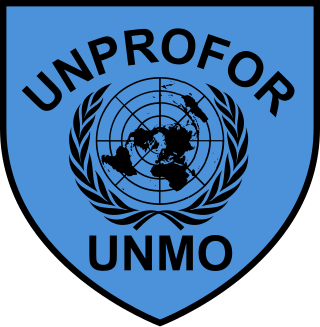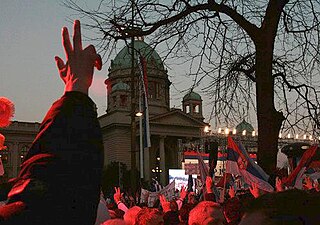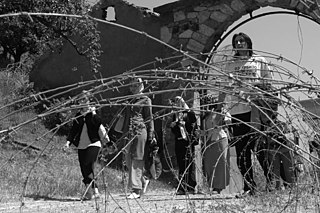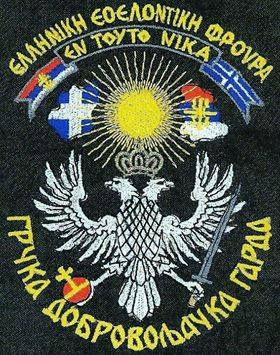
The Balkans, also known as the Balkan Peninsula, is a geographical area in southeastern Europe with various geographical and historical definitions. The region takes its name from the Balkan Mountains that stretch throughout the whole of Bulgaria. The Balkan Peninsula is bordered by the Adriatic Sea in the northwest, the Ionian Sea in the southwest, the Aegean Sea in the south, the Turkish straits in the east, and the Black Sea in the northeast. The northern border of the peninsula is variously defined. The highest point of the Balkans is Musala, 2,925 metres (9,596 ft), in the Rila mountain range, Bulgaria.

The Kosovo War was an armed conflict in Kosovo that lasted from 28 February 1998 until 11 June 1999. It was fought between the forces of the Federal Republic of Yugoslavia, which controlled Kosovo before the war, and the Kosovo Albanian rebel group known as the Kosovo Liberation Army (KLA). The conflict ended when the North Atlantic Treaty Organization (NATO) intervened by beginning air strikes in March 1999 which resulted in Yugoslav forces withdrawing from Kosovo.

The United Nations Interim Administration Mission in Kosovo (UNMIK) is the officially mandated mission of the United Nations in Kosovo. The UNMIK describes its mandate as being to "help the United Nations Security Council achieve an overall objective, namely, to ensure conditions for a peaceful and normal life for all inhabitants of Kosovo and advance regional stability in the Western Balkans."

The Kosovo Liberation Army was an ethnic Albanian separatist militia that sought the separation of Kosovo, the vast majority of which is inhabited by Albanians, from the Federal Republic of Yugoslavia (FRY) and Serbia during the 1990s. Albanian nationalism was a central tenet of the KLA and many in its ranks supported the creation of a Greater Albania, which would encompass all Albanians in the Balkans, stressing Albanian culture, ethnicity and nation.

The Yugoslav Wars were a series of separate but related ethnic conflicts, wars of independence, and insurgencies that took place in the SFR Yugoslavia from 1991 to 2001. The conflicts both led up to and resulted from the breakup of Yugoslavia, which began in mid-1991, into six independent countries matching the six entities known as republics which previously comprised Yugoslavia: Slovenia, Croatia, Bosnia and Herzegovina, Montenegro, Serbia, and North Macedonia. Yugoslavia's constituent republics declared independence due to unresolved tensions between ethnic minorities in the new countries, which fuelled the wars. While most of the conflicts ended through peace accords that involved full international recognition of new states, they resulted in a massive number of deaths as well as severe economic damage to the region.

The Kosovo Force (KFOR) is a NATO-led international peacekeeping force in Kosovo. Its operations are gradually reducing until Kosovo's Security Force, established in 2009, becomes self-sufficient.

The United Nations Protection Force was the first United Nations peacekeeping force in Croatia and in Bosnia and Herzegovina during the Yugoslav Wars. The force was formed in February 1992 and its mandate ended in March 1995, with the peacekeeping mission restructuring into three other forces.
The history of Kosovo dates back to pre-historic times when the Starčevo culture, Vinča culture, Bubanj-Hum culture, and Baden culture were active in the region. Since then, many archaeological sites have been discovered due to the abundance of natural resources which gave way to the development of life.

The three-finger salute (Serbian: поздрав са три прста, romanized: pozdrav sa tri prsta; or three fingers,, commonly known as the Serbian salute, is a salute which the thumb, index, and middle finger are extending. It originally expressed the Holy Trinity, used in oath-taking, and a symbol of Serbian Orthodoxy, that today simply is an expression, a gesture, for ethnic Serbs, and Serbia.

Nataša Kandić is a Serbian human rights activist and coordinator of the RECOM Reconciliation Network, founder and ex-executive director of the Humanitarian Law Center (HLC), an organization campaigning for human rights and reconciliation in the former Yugoslavia, focusing on the Serbian role in the conflict. It was formed in 1992. The HLC's research was integral to the war crimes prosecutions of the International Criminal Tribunal for the Former Yugoslavia (ICTY), particularly the "smoking gun" video linking Serbian military forces to the Srebrenica massacres. She has won numerous international awards for her human rights work. She is a figure of controversy in Serbia where she was the subject of a defamation lawsuit by former President of Serbia Tomislav Nikolić.
The Podujevo bus bombing was an attack on a bus carrying Serb civilians near the town of Podujevo in Kosovo on 16 February 2001. The bombing killed twelve Serb civilians who were travelling to Gračanica and injured dozens more. Albanian extremists are suspected of being responsible for the attack. Gračanica is a predominantly Serb-populated town in central Kosovo, near the regional capital Pristina, in a predominantly Albanian-populated area. Following the Kosovo War in 1999 it became an enclave within Albanian-controlled territory. Relations between the two communities were tense and occasionally violent.

The 2004 unrest in Kosovo is the worst ethnic violence case in Kosovo since the end of the 1998–99 conflict. The violence erupted in the partitioned town of Kosovo Mitrovica, leaving hundreds wounded and at least 14 people dead. The unrest was precipitated by misleading reports in the Kosovo Albanian media which falsely claimed that three Kosovo Albanian boys had drowned after being chased into the Ibar River by a group of Kosovo Serbs. UN peacekeepers and NATO troops scrambled to contain a raging gun battle between Serbs and Albanians. Serbs call the event the March Pogrom, while the Albanians call it the March Unrest.
Kosovo during the 20th century history has largely been characterised by wars and major population displacements. The region formed a part of numerous entities, some internationally recognised, others not.

Greece and Serbia enjoy close diplomatic relations, which have traditionally been friendly due to cultural, religious and historical ties between the two nations.
The Yugoslav Wars were a series of armed conflicts on the territory of the former Socialist Federal Republic of Yugoslavia (SFRY) that took place between 1991 and 2001. This article is a timeline of relevant events preceding, during, and after the wars.

The Greek Volunteer Guard was a unit of Greek volunteers that fought in the Bosnian War on the side of the Army of the Republika Srpska. Some members of the unit are alleged to have been present in the area of the Srebrenica massacre and reportedly hoisted a Greek flag over the town, which was recorded 'for marketing purposes'.

The Church of Saint Elijah, also known as Saint Andrew's Church, is а Serbian Orthodox church located on a small hill near the city of Podujevo, in Kosovo. The complex includes an Orthodox cemetery. It was built in 1929, and has been demolished several times, as of 2010, the church has been rebuilt and renovated five times.

Serbia was involved in the Yugoslav Wars, which took place between 1991 and 1999—the war in Slovenia, the war in Croatia, the war in Bosnia, and in Kosovo. From 1991 to 1997, Slobodan Milošević was the President of Serbia. Serbia was part of the Federal Republic of Yugoslavia (FRY). The International Criminal Tribunal for the Former Yugoslavia (ICTY) has established that Milošević was in control of Serb forces in Bosnia and Herzegovina and Croatia during the wars which were fought there from 1991 to 1995.

The architectural heritage of the Kosovo Albanians during Yugoslav rule was shown institutionalised disregard for decades prior to outright conflict at the end of the 20th century. Numerous Albanian cultural sites in Kosovo were destroyed during the period of Yugoslav rule and especially the Kosovo conflict (1998-1999) which constituted a war crime violating the Hague and Geneva Conventions. In all, 225 out of 600 mosques in Kosovo were damaged, vandalised, or destroyed alongside other Islamic architecture during the conflict. Additionally 500 Albanian owned kulla dwellings and three out of four well-preserved Ottoman period urban centres located in Kosovo cities were badly damaged resulting in great loss of traditional architecture. Kosovo's public libraries, of which 65 out of 183 were completely destroyed, amounted to a loss of 900,588 volumes, while Islamic libraries sustained damage or destruction resulting in the loss of rare books, manuscripts and other collections of literature. Archives belonging to the Islamic Community of Kosovo, records spanning 500 years, were also destroyed. During the war, Islamic architectural heritage posed for Yugoslav Serb paramilitary and military forces as Albanian patrimony with destruction of non-Serbian architectural heritage being a methodical and planned component of ethnic cleansing in Kosovo.
Foreign support in the Bosnian War included the funding, training or military support by foreign states and organizations outside Yugoslavia to any of the belligerents in the Bosnian War (1992–95).